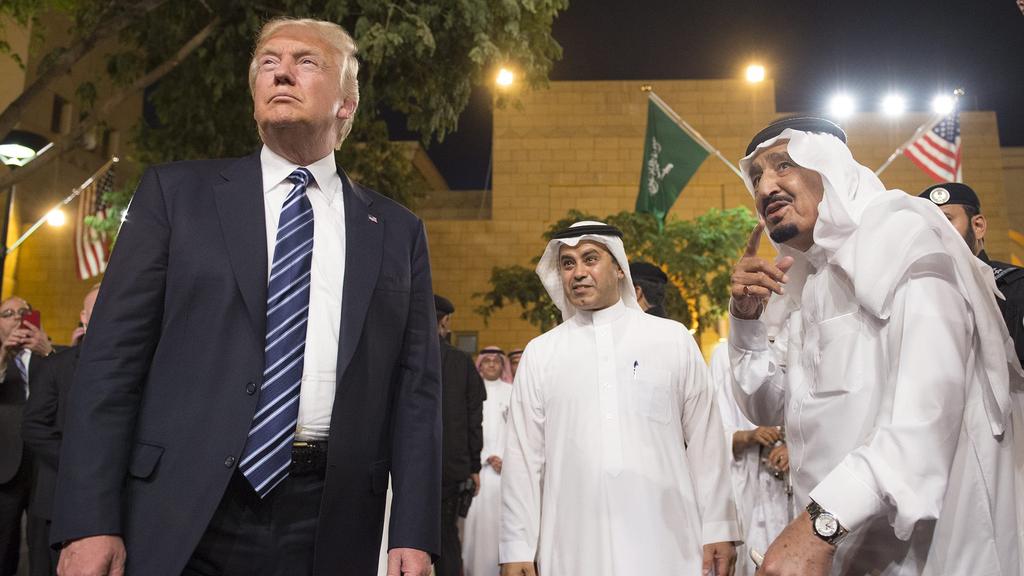America’s growing lack of interest in the Middle East comes at its peril
غياب اهتمام أميركا بالشرق الأوسط يعطي أخطاره
Michael Young/The National/December 27/17
It is remarkable that in just nine years, the United States has lost much of the influence it once had in the Middle East, which it had taken more than six decades to build. Ironically, under both presidents Barack Obama and Donald Trump, the decline has largely been voluntary, from administrations that initially claimed they would coolly pursue US national interests.
Mr Obama couched his disinterest in the Middle East in what was termed his “pivot to Asia”, which was effectively a pivot away from the region. Mr Trump, in turn, has promised to reverse his predecessor’s disengagement, vowing to contain Iran’s growing influence. However, it has been mostly words until now. There have been few efforts to push back against Iran in Syria, Iraq, Lebanon, or Yemen, build a united Arab front against Tehran, or move forward in Palestinian-Israeli talks, a reality the Iranians have attempted to exploit.
During the Second World War, Washington defined a post-war role in the Middle East at a meeting between Franklin Roosevelt and King Abdulaziz Al Saud. The Americans sought a stable supply of oil in return for US military support for the Kingdom. This oil-for-security arrangement was a pillar of Washington’s regional presence until Mr Obama took a different tack as the US itself became a major oil supplier and pursued an opening to Iran in 2015.
During the 1950s, the Eisenhower administration intervened forcefully to impose a settlement on Britain, France and Israel in the aftermath of the Suez Crisis of 1956. This marked the first moment of affirmation against the former colonial powers in the region. The US focus then was on containing Soviet influence, which involved, for a time, building ties to anti-communist Arab nationalist regimes. That was before the US formulated the Eisenhower doctrine, offering aid to countries threatened by armed aggression from another state.
US intervention in Lebanon in 1958, like the overthrow of Iranian prime minister Mohammed Mossadegh in 1953, was partly driven by fear that Moscow might gain ground, even if realities in both countries were different.
Following the Arab-Israeli war of 1967, Washington took a different approach to the Middle East. The war placed a settlement of the Arab-Israeli conflict at the centre of regional preoccupations and only the US could be the mediator. By the end of the decade, Washington had become a major weapons supplier to Israel, even as Egypt’s leaders came to understand that the Americans alone could secure an Israeli withdrawal from the occupied Sinai.
The 1970s was the decade in which US supremacy would be greatly strengthened, despite the revolution in Iran. The Soviet Union could not compete with the US in the range of initiatives over which Washington had a say, from the negotiations after the 1973 Arab-Israeli war to those leading up to the Camp David Accords of 1978. Even prominent Soviet allies, such as Syria under then president Hafez Al Assad, understood they needed to open channels to the US.
This pattern would more or less continue until 2009, when Mr Obama sought a conceptual change towards the region. He was reacting to eight years of president George W Bush, during which the US had engaged in several wars in the greater Middle East, causing a major economic burden for the country. To Mr Obama, the region had eaten up too much US time and money and he questioned the foundations of previous US behaviour in the region.
While in office, Mr Obama engaged with the Arab world reluctantly and when he did so, he brought a revisionist reconsideration of the past. For instance, he undermined the security understanding with Saudi Arabia by trying to establish a new relationship with the Iranian regime, which Riyadh viewed then, and still does, as a regional aggressor.
In an interview with Jeffrey Goldberg, Mr Obama famously said the Saudis and Iran needed “to find an effective way to share the neighbourhood and institute some sort of cold peace.” His efforts did not lead to the expected detente, with Iran’s hardliners blocking progress, even as Arab allies lost faith in Washington.
Mr Trump has sought to portray himself as the anti-Obama but he suffers from the same faults as his predecessor. Both men showed a marked lack of interest in the Middle East, ignoring it at at their peril. With their focus on fighting ISIL, neither outlined a coherent US strategy for the region that would build on the strengths and ties of the past, although Mr Trump still has time to reverse that.
This attitude has cost the US the unchallenged influence it previously enjoyed. Now, old allies such as Saudi Arabia and Egypt aren’t hesitating to deal with Russia. America’s isolation from negotiations over Syria’s future, like the recent US moves in Jerusalem undermining its mediation role in prospective peace talks, have surrendered key levers of Washington’s regional power. Why a country with much clout should have given it all up for nothing in return remains a mystery.
Mr Trump wants to make America great again. Mr Obama always seemed fixated on the limits of American power. Neither could see that an unwillingness to defend and actively redefine America’s position in a volatile Middle East would only confirm its loss of direction in the world.























